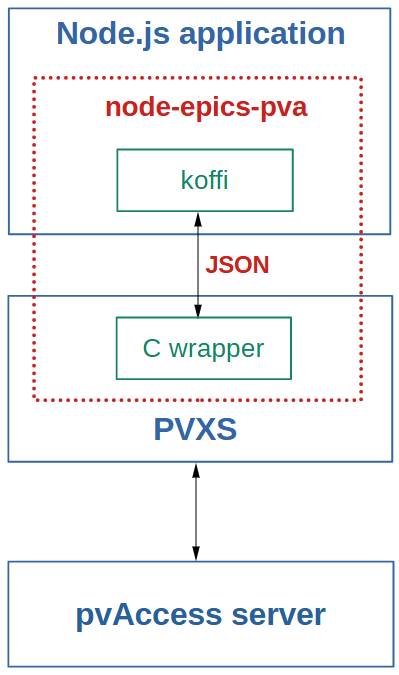node-epics-pva is lightweight EPICS pvAccess client library for Node.js, it is a FFI wrapper that talks to the PVXS shared library using a third-party Node.js FFI package called koffi.
It provides three simple interfaces, in which get() and put() are simple blocking implementations,
- get()
- put()
- monitor()
The implementation of node-epics-pva is building a wrapper into the PVXS shared library to provide C interface and calling the C interface from Node.js using koffi. The format of data exchange between the wrapper and Node.js is JSON.
-
Node.js 14.21.3
-
Node.js 15.14.0
-
Node.js 16.19.0
-
Node.js 17.9.1
-
Node.js 18.13.0
- Windows x86_64
- Linux x86_64
- macOS x86_64
npm install node-epics-pvaNODE_EPICS_PVA_WAIT_TIMEOUT can be set optionally, for example,
export NODE_EPICS_PVA_WAIT_TIMEOUT=2.0Simple functions like pvget, pvput and pvmonitor are provided.
const PV = require('node-epics-pva');
let value = PV.get('calcExample');
console.log(value);const PV = require('node-epics-pva');
PV.put("calcExample", 10);
PV.put("rec:X", 40);
PV.put("rec:Y", { value: 50 });
PV.put("grp:name", { 'X.value': 10, 'Y.value': 20 });const PV = require('node-epics-pva');
PV.monitor('calcExample', function(data) {
console.log('Current:', data);
});
// Test purpose only, prevent the node.js main thread from exiting
setTimeout(function() {
console.log("Done!!!");
}, 3600 * 1000);record(calc, "calcExample")
{
field(DESC, "Counter")
field(SCAN,"1 second")
field(FLNK, "aiExample")
field(CALC, "(A<B)?(A+C):D")
field(INPA, "calcExample.VAL NPP NMS")
field(INPB, "70")
field(INPC, "1")
field(INPD, "30")
field(EGU, "Counts")
field(HOPR, "10")
field(HIHI, "8")
field(HIGH, "6")
field(LOW, "4")
field(LOLO, "2")
field(HHSV, "MAJOR")
field(HSV, "MINOR")
field(LSV, "MINOR")
field(LLSV, "MAJOR")
}
record(waveform, "wf1Example")
{
field(DTYP, "Soft Channel")
field(FTVL, "DOUBLE")
field(NELM, "16")
field(INP, [1, 2, 3, 4, 5, 6, 7, 8])
}
Accessing the calc and waveform records above will return the following JSON data,
{
"id": "epics:nt/NTScalar:1.0",
"value": 43,
"alarm": {
"id": "alarm_t",
"severity": 2,
"status": 1,
"message": "HIHI"
},
"timeStamp": {
"secondsPastEpoch": 1686719557,
"nulloseconds": 144609643,
"userTag": 0
},
"display": {
"limitLow": 0,
"limitHigh": 10,
"description": "Counter",
"units": "Counts",
"precision": 0,
"form": {
"id": "enum_t",
"index": 0,
"choices": ["Default", "String", "Binary", "Decimal", "Hex", "Exponential", "Engineering"]
}
},
"control": {
"id": "control_t",
"limitLow": 0,
"limitHigh": 10,
"minStep": 0
},
"valueAlarm": {
"id": "valueAlarm_t",
"active": 0,
"lowAlarmLimit": 2,
"lowWarningLimit": 4,
"highWarningLimit": 6,
"highAlarmLimit": 8,
"lowAlarmSeverity": 0,
"lowWarningSeverity": 0,
"highWarningSeverity": 0,
"highAlarmSeverity": 0,
"hysteresis": 0
}
}
{
"id": "epics:nt/NTScalarArray:1.0",
"value": [1, 2, 3, 4, 5, 6, 7, 8],
"alarm": {
"id": "alarm_t",
"severity": 3,
"status": 2,
"message": "UDF"
},
"timeStamp": {
"secondsPastEpoch": 631152000,
"nulloseconds": 0,
"userTag": 0
},
"display": {
"limitLow": 0,
"limitHigh": 0,
"description": "",
"units": "",
"precision": 0,
"form": {
"id": "enum_t",
"index": 0,
"choices": ["Default", "String", "Binary", "Decimal", "Hex", "Exponential", "Engineering"]
}
},
"control": {
"id": "control_t",
"limitLow": 0,
"limitHigh": 0,
"minStep": 0
},
"valueAlarm": {
"id": "valueAlarm_t",
"active": 0,
"lowAlarmLimit": null,
"lowWarningLimit": null,
"highWarningLimit": null,
"highAlarmLimit": null,
"lowAlarmSeverity": 0,
"lowWarningSeverity": 0,
"highWarningSeverity": 0,
"highAlarmSeverity": 0,
"hysteresis": 0
}
}
| Number of PVs | pvget (seconds) | pvput (seconds) |
|---|---|---|
| 1 | 0.034 | 0.026 |
| 10 | 0.217 | 0.210 |
| 50 | 1.049 | 1.060 |
| 100 | 2.120 | 2.100 |
| 200 | 4.222 | 4.127 |
| 500 | 10.569 | 10.465 |
The test environment is as follows, the client and IOC are in different virtual machines and different subsets.
-
Debian Linux 10 (buster)
-
Intel Core Processor (Haswell), 4-core, 2.4GHz
-
8GB memory
- get() and put() are simple blocking implementation, if PVs are not available, the main thread of Node.js will block.
- Only epics:nt/NTScalar:1.0 and epics:nt/NTScalarArray:1.0 data types are tested, other data types are not guaranteed to be parse successfully.
MIT license
